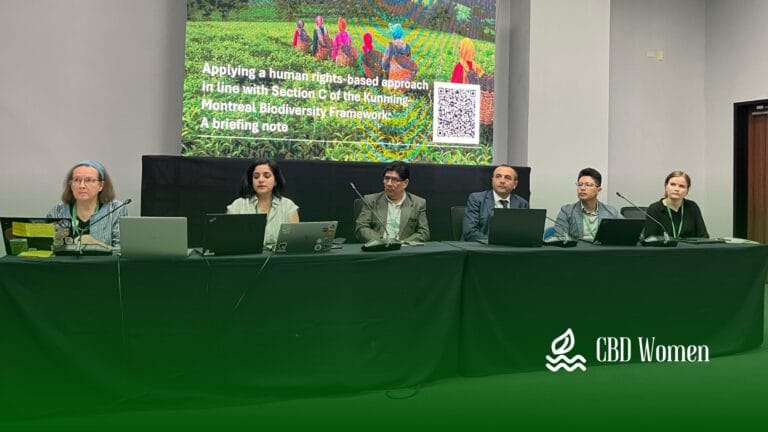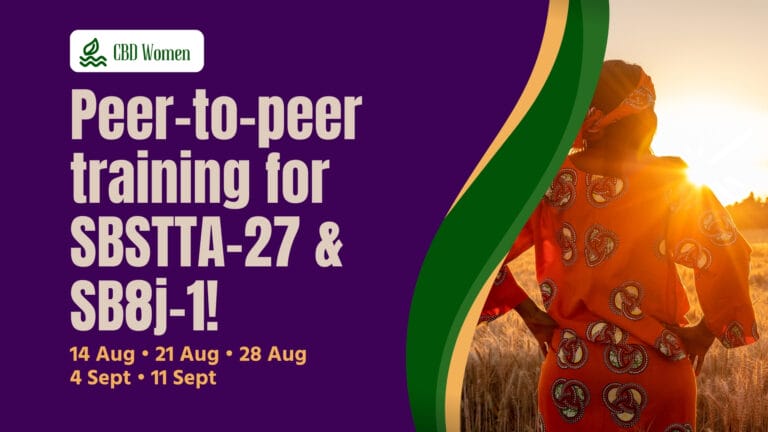Press Conference – CBD Women’s Caucus | Panama City, 20 October 2025
On 20 October 2025, the CBD Women’s Caucus hosted a press conference titled “No Compromise, No Delay: Women and Girls Demand Action at SBSTTA-27” on the first floor of the Panama Convention Center.
The event brought together women leaders, scientists, and advocates who raised their voices for inclusive and rights-based approaches in global biodiversity governance.
Moderated by Fatima El-Aaraby, CBD Women’s Caucus project officer from Morocco, the press conference provided a powerful platform for the Caucus to present its key demands on the main items under discussion at the Twenty-Seventh Meeting of the Subsidiary Body on Scientific, Technical and Technological Advice (SBSTTA-27) — including the Global Biodiversity Framework (GBF) review, IPBES, climate change, invasive species, and scientific and technical cooperation.
Context of SBSTTA-27
SBSTTA-27 is taking place in Panama City, from 20 to 24 October 2025, bringing together government representatives and experts to provide scientific and technical advice for the implementation of the Kunming–Montreal Global Biodiversity Framework (GBF).
The CBD Women’s Caucus stresses that these processes must not only be technically sound but also inclusive, gender-responsive, and rights-based, ensuring that women, girls, Indigenous Peoples, and local communities are at the heart of decision-making and action.
Key Messages and Thematic Interventions
Global Review of the Kunming–Montreal Global Biodiversity Framework
Speaker: Ms. Cristina Eghenter (WWF International, Member of the Board of Directors for CBD WC, Italy)
Cristina Eghenter emphasized that the first global review of the GBF must go beyond technical evaluation and become a moment of accountability for all Parties. She stressed that biodiversity monitoring and review processes should integrate multiple sources of evidence, including voluntary contributions from women’s organizations, local communities, and Indigenous Peoples. Cristina underlined that the inclusion of findings from the mid-term review of the Gender Plan of Action is critical to ensuring that gender commitments move from words to measurable and tangible action.
IPBES and Transformative Change
Speaker: Ms. Scovia Ampumuza (Rwanda)
Ms. Scovia Ampumuza highlighted that IPBES must move beyond gender-blind approaches and embed gender equality and rights across all its assessments. She explained that transformative change requires a shift in power structures and not just increased participation. Scovia called for biodiversity policies that equitably redistribute power, benefits, and responsibilities among women, youth, Indigenous Peoples, and local communities, ensuring that these groups are central actors in decision-making and implementation.
Biodiversity and Climate Change
Speaker: Ms. Valentina Figuera Martínez (Global Forest Coalition, Venezuela)
Ms. Valentina Figuera Martínez underscored that the climate and biodiversity crises are inseparable and must be addressed through coherent, gender-responsive, and human-rights-based approaches. She called on Parties to guarantee direct and equitable access to finance for women, youth, and Indigenous Peoples, emphasizing the need to strengthen safeguards in Nature-based Solutions to prevent environmental and social harm.
Invasive Alien Species
Speaker: Ms. Alumita Sekinairai (iTaukei Women in Conservation, Fiji)
Ms. Alumita Sekinairai called for recognizing Indigenous and local women as leaders in invasive species management and monitoring. She emphasized the importance of protecting traditional knowledge systems from exploitation and ensuring that biodiversity conservation integrates One Health and gender perspectives. Alumita urged governments and research institutions to work collaboratively with local women’s organizations to ensure effective prevention and management of invasive alien species at community levels.
Although no decision on Observer mechanisms was adopted during this session, the intervention was welcomed by the GEF Secretariat and led to commitments for:
- Pre-Council Observer briefings to be institutionalized starting from the next meeting
- Consideration of a formal feedback system ahead of Council sessions
- Greater transparency in tracking Indigenous Peoples and local communities, and gender-related allocations in GBFF-funded projects
For the CBD Women’s Caucus, this meeting marked a clear step forward in visibility and influence, but now what comes next:
- Engaging with the GEF Secretariat to follow up on proposed mechanisms for Observer input;
- Co-developing a submission with youth and Indigenous partners for improved Observer engagement structures;
- Preparing for CBD COP17, where financing, implementation, and inclusion will again be under review.
Scientific and Technical Needs
Speaker: Ms. Pamela Tapia (Mexico)
Ms. Pamela Tapia emphasized that science that fails to consider gender perspectives remains incomplete. She called on Parties to strengthen the Gender and Biodiversity Programme of Work, integrate sex-disaggregated data into research and reporting, and recognize women’s knowledge — whether traditional, local, or scientific — as essential to fostering innovation and effective biodiversity policy.
During her intervention, Pamela also announced the launch of the new Policy Brief: “Assessing Gender-Responsiveness in National Biodiversity Strategies and Action Plans (NBSAPs)”, available in five languages — English, French, Spanish, Arabic, and Portuguese. The publication, developed by the CBD Women’s Caucus, provides concrete recommendations and highlights country examples on integrating gender equality into biodiversity planning and implementation.




